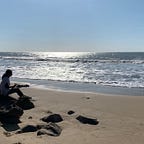Unlearning —A road to liberation
Unlearning and relearning make our life beautiful. In the vast tapestry of our existence, there are patterns that we must shed, behaviors that no longer serve us, and wounds from the past that need healing.
Design by the author
Unlearning is the liberation from the generations of harm that the older generation has passed on to us. It is a karmic process that takes time, but ultimately leads to personal and collective growth, resulting in a more beautiful life.
To truly embark on the journey of unlearning, we must first recognize the patterns and behaviors that no longer align with our true selves. These patterns are often deeply ingrained in us, shaped by societal norms or parental expectations. They have become so familiar that we may not even be aware of their existence or their negative impact on our lives.
For example, we may have learned to suppress our emotions or conform to societal norms of success, believing that attaining wealth and status is the epitome of a beautiful life. However, through unlearning, we can start questioning these beliefs, challenging their validity, and exploring alternative paths that align with our own values and desires.
Unlearning is not an easy process; it requires self-reflection, introspection, and often the willingness to confront uncomfortable truths. It is a process of unraveling the layers that have been built upon us throughout our lives. It is peeling back the conditioned responses and rediscovering our authentic selves.
Unlearning is not just an individual journey; it is also a collective one. It is about breaking the generational cycle of harm, challenging the outdated beliefs and values that have been passed down to us.
By unlearning the prejudices, biases, and harmful patterns of the past, we create space for a more inclusive and compassionate society.
The process of relearning goes hand in hand with unlearning. It is about embodying new behaviors and beliefs that align with our personal growth and the betterment of the world around us. Relearning is about embracing new perspectives, challenging and expanding our worldview, and adopting healthier habits that nurture our mental, emotional, and physical well-being.
When we relearn, we personify new behaviors that are aligned with our true nature. We learn to express our emotions authentically, to set healthy boundaries, and to cultivate meaningful relationships. We relearn the value of self-care, prioritizing our own well-being, and acknowledging that true beauty comes from within.
Simultaneously, relearning opens the door for healing from past wounds. Often, the patterns we need to unlearn are rooted in trauma or painful experiences. By acknowledging and addressing these wounds, we can begin to heal. Relearning is the act of rewriting our own narratives, replacing self-limiting beliefs with empowering ones, and embracing the beauty of our scars.
The process of unlearning and relearning takes time; it is not a one-time event but an ongoing journey. It requires patience, self-compassion, and a willingness to embrace discomfort. It is a karmic process where we undo the harm done by previous generations and create a better foundation for future generations.
So, unlearning and relearning are transformative processes that make our lives beautiful. By shedding patterns, embodying new behaviors, and healing from past wounds, we embark on a journey of personal growth and collective liberation. It may be challenging, but the rewards are immense. The act of unlearning is an act of breaking free from the chains of the past, while relearning is an act of embracing our true selves and creating a more beautiful future. In this process, we not only find our own beauty but also contribute to the beauty of the world around us.
Photograph by the author
